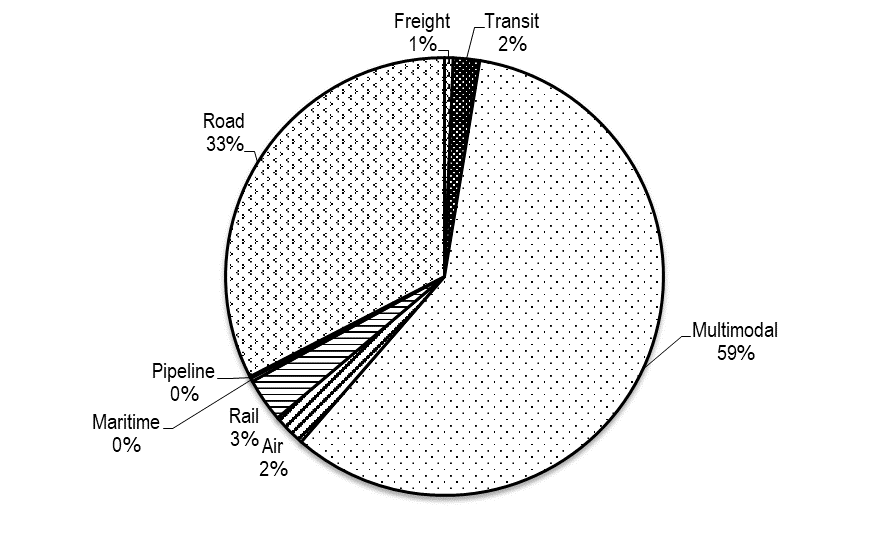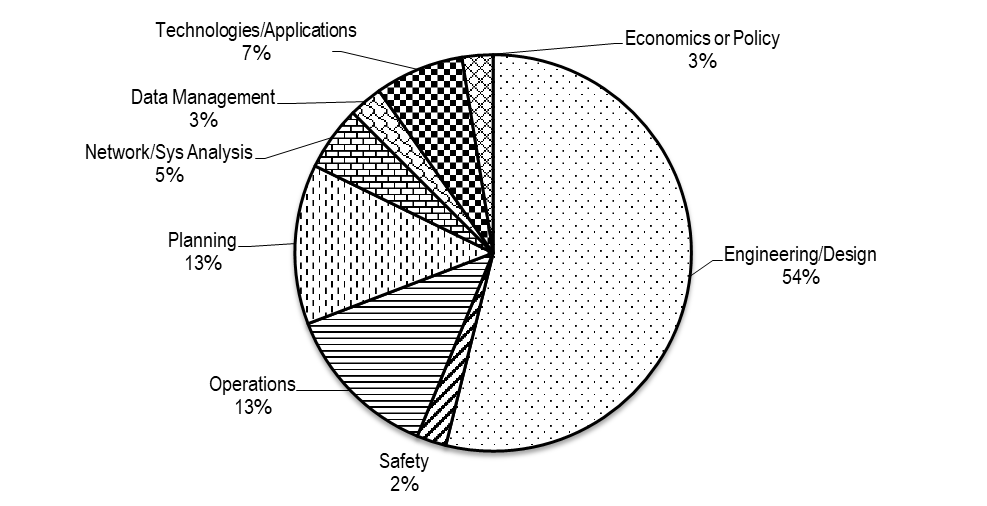See the full listing of undergraduate courses and the full listing of graduate courses reviewed as part of this project.
Investments in training to support TSMO include the training itself, which should include a basic level of understanding of TSMO and what it offers to the organization for all management employees, more specific TSMO training for employees who work in TSMO-related functions (e.g. traffic operations, maintenance, performance management, ITS), and specialized training for specific TSMO functional areas. Basic training should be developed and offered in-house as part of ongoing professional development. More specialized training can be provided in-house or obtained through outside sources such as professional organizations, universities, or Federal Highway Administration (FHWA) workshops. A strategic approach to TSMO training will require the development of a formal training plan, which will require an investment in time by TSMO management and HR staff to determine the specific and general training needs, sources, and associated policies for training. Existing training and certification programs should be used to augment TSMO workforce professional development. Given the wide spectrum of knowledge required to operate a TSMO program, there are many organizations that provide training, certification, and research related to TSMO. Table 8 lists organizations that offer TSMO-related training, certification, or conduct TSMO-related research.
Organization TSMO Related Training and Research
|
Organization |
Training Provider |
Certification |
Direct TSMO Research |
Indirect TSMO Research |
|---|---|---|---|---|
|
American Association of State Highway and Transportation Officials |
X |
|
X |
X |
|
America Consulting Engineers Companies |
X |
|
|
|
|
American Public Transit Association |
X |
|
|
|
|
American Road & Transportation Builders Association |
X |
|
|
X |
|
American Society of Civil Engineers |
X |
|
|
|
|
American Traffic Safety Services Association |
X |
|
|
|
|
Consortium for ITS Training and Education |
X |
X |
|
|
|
Community Transportation Association of America |
X |
X |
|
|
|
Connected Vehicle Trade Association /Mobile Comply/ Society of Automotive Engineers International |
X |
X |
|
|
|
Council of Supply Chain Management Professionals |
X |
|
|
X |
|
Eno Center for Transportation |
X |
|
|
X |
|
International Municipal Signal Association |
|
X |
|
|
|
Institute of Transportation Engineers |
X |
|
|
|
|
Intelligent Transportation Society of America |
X |
|
|
|
|
ITS Standards Training |
|
|
|
|
|
National Academy of Sciences/ Transportation Research Board |
X |
|
X |
X |
|
National Highway Institute |
X |
|
|
|
|
National Operations Center of Excellence |
|
|
X |
X |
|
National Institute for Certification in Engineering Technologies |
|
X |
|
|
|
National Transit Institute |
X |
|
|
|
|
Occupational Safety Institute |
X |
|
|
|
|
PDH Source |
X |
|
|
|
|
Small Urban and Rural Transit Center |
X |
|
|
X |
|
United States Department of Transportation Federal Highway Administration Office of Operations |
X |
|
X |
X |
|
United States Department of Transportation ITS Joint Program Office |
X |
|
X |
X |
|
United States Department of Transportation Volpe Center |
|
|
X |
X |
A review of all Accreditation Board for Engineering and Technology, Inc. (ABET) accredited civil engineering programs in the United States (based on ABET program listing as of October 2018) revealed nearly 800 transportation-related undergraduate courses and almost 550 graduate courses being offered in civil engineering departments across the country. Course descriptions were analyzed and courses were categorized by both modal focus and topic area. Topic areas were aligned with the categories from the professional development program assessment where possible. However, many of the topics assessed for professional development programs were not found in the review of undergraduate and graduate courses. This may be due to the fact that course descriptions did not provide the level of detail necessary to fully assess course content or that many of the topics required for professional development are emerging as the field of transportation operations evolves and this content has not yet made its way into college-level courses. Thus, a more concise and somewhat broader set of topics was used to analyze the undergraduate and graduate courses. Table 9 shows the topic areas examined for professional development and college courses.
Topic Areas Analyzed for College and Professional Development Courses
|
Civil Engineering College Level Courses |
TSMO Professional Development Courses |
|---|---|
|
|
The results of the review indicate that the vast majority of undergraduate courses have a multi-modal focus, and the majority concentration on engineering/design, followed by planning and operations. Given that most civil engineering programs require only one course in transportation, these results are not surprising as the introductory course typically provides a survey of topics, with a primary focus on design. Figure 22 provides results of the analysis of modal focus, and Figure 23 presents topical focus for the 774 undergraduate courses reviewed as part of this project. As some courses provided content for more than one content area, the summation of percentages is greater than 100%.
Figure 22. Modal Focus of Undergraduate Civil Engineering Courses in ABET Accredited Colleges and Universities in the United States

Figure 23. Course Topics of Undergraduate Civil Engineering Courses in ABET Accredited Colleges and Universities in the United States

Somewhat different results were found for graduate programs. Of the 543 courses, the majority provided a multimodal or road (traditional traffic/highway) focus. For course topic areas, courses in design and planning comprised less of graduate offerings, while more emphasis was found in operations, safety, technologies and applications, and network or systems analysis than in undergraduate programs. Appendix A provides a full listing of undergraduate courses and Appendix B a full listing of graduate courses reviewed as part of this project.
There are currently more than 300 post-secondary education programs available for TSMO-related professional development or post-secondary training offered outside of a formal collegiate setting. The table below describes the training available by category. It is apparent from this analysis that there are several topics with limited resources available for professionals, particularly training related to legal procurement and system security for TSMO. Advanced training on all TSMO topic areas is sparse. The topics that have received the greatest attention are those related to engineering/design, operations, safety, and technologies/applications in TSMO.
Inventory of Existing TSMO Training
|
Topic Area |
Training Level |
Total |
||
|---|---|---|---|---|
|
Advanced |
Basic |
Introductory |
||
|
System Architecture |
1 |
4 |
6 |
11 |
|
Connected Vehicles |
- |
22 |
1 |
23 |
|
Data Management |
2 |
8 |
- |
10 |
|
Decision Support |
- |
12 |
- |
12 |
|
Engineering/Design |
1 |
32 |
2 |
35 |
|
Leadership |
4 |
9 |
- |
13 |
|
Legal |
- |
3 |
- |
3 |
|
Traffic Operations |
6 |
22 |
2 |
30 |
|
Performance Management |
2 |
15 |
3 |
20 |
|
Planning |
3 |
25 |
3 |
31 |
|
Procurement |
- |
4 |
- |
4 |
|
Safety |
1 |
27 |
1 |
29 |
|
Standards |
- |
13 |
4 |
17 |
|
Strategy/Challenges |
- |
12 |
- |
12 |
|
System Security |
- |
5 |
- |
5 |
|
Systems Engineering |
1 |
9 |
2 |
12 |
|
Technologies/ Applications |
- |
25 |
5 |
30 |
|
Traffic Maintenance |
9 |
28 |
2 |
39 |
|
Grand Total |
30 |
275 |
31 |
336 |
Additional Resources
TSMO programs and curriculum at the university level will be a key driver for expanding the transportation workforce and enable both public and private sector to better serve the traveling public.
The University of Memphis and their Southeast Transportation Workforce Center are developing an undergraduate course on transportation operations. Course overviews, curriculum, and outcomes are available here.
Additionally, the National Network of Transportation Workforce Centers has developed a Career Pathways Initiative to engage students in the post-secondary educational continuum to choose transportation career pathways. The demonstrations will leverage insights from employers to empower students to first learn about critical transportation occupations and then develop the skills to meet the related workforce challenges. With multidisciplinary specialists, stakeholders from across the country, and extensive labor market analysis, the national network team is uniquely positioned to carry out the goals of the strategic initiative. The career pathway demonstration programs will prepare future transportation professionals to develop industry competencies and move beyond disciplinary silos to address transportation workforce challenges throughout the nation. Join the Career Pathways Initiative here.
Additional resources, collected by the Southeast Transportation Workforce Center:
For Teachers
National Employability Skills Framework: Central clearinghouse on resources for instruction and assessment for employability skills
Strengthening Skills Training & Career Pathways Across the Transportation Industry: Fact sheet and full report examining six subsectors in transportation including: trucking, highway construction and maintenance, transit and ground passenger transportation, rail, air, and maritime transportation
Transportation, Distribution, and Logistics (TDL) Competency Model: Collaboratively developed competency model highlighting personal, academic, workplace, industry, and sector competencies necessary for success in TDL careers
Heavy Highway Civil Construction Competency Model: Collaboratively developed competency model highlighting personal, academic, workplace, industry, and sector competencies necessary for success in highway civil construction careers
Transportation Lesson Plans (www.transportationcareers.org): Resources developed through Career Clusters partnership between US Department of Transportation and National Association of State Directors of Career and Technical Education, including transportation careers modules, fully tested problem-based scenarios, and other materials to support integration of transportation topics in the classroom
Transportation Lesson Plans (from University of Memphis Transportation Engineering Careers program): Standards-based lesson plans integrating science, technology, engineering, and math content in hands-on, problem-based format set within a transportation context
Go! Exploring the World of Transportation: Web resource containing career information, curriculum, articles, and comics related to transportation
For Students
Fast Forward: Comprehensive, interactive web resource containing transportation career profiles, video interviews of transportation professionals, career exploration newsletter, and transportation-related scholarship and internship opportunities
US Department of Transportation Federal Highway Administration (FHWA) Careers: Resources highlighting FHWA careers, the online application process, and internship programs
US Department of Transportation Careers in Motion: Student Employment Initiative resources including internships, volunteer opportunities, descriptions of jobs by college major, and tips for getting prepared for a career with US DOT
O*NET OnLine Transportation, Distribution, and Logistics Career Cluster: Career resources including job categories, detailed work descriptions, and required skills, knowledge, education, and/or certifications for transportation career cluster occupations with links to job openings, apprenticeships, and training programs
West Tennessee STEM Hub: Transportation fact sheets and professional profiles (STEM Spotlights) highlighting transportation career opportunities